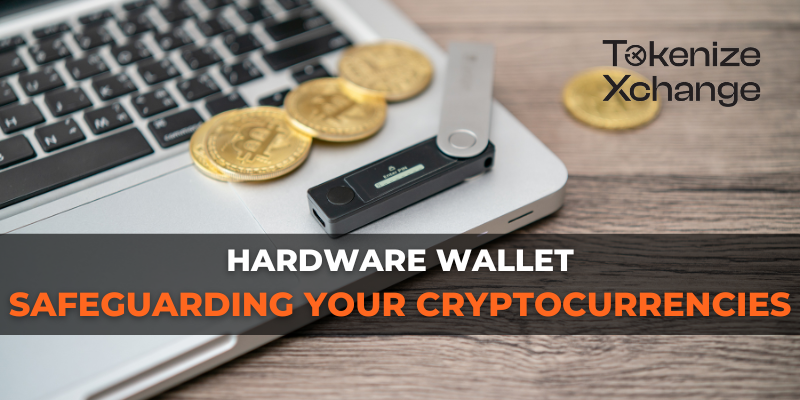The world of cryptocurrencies is dynamic, ever-evolving, and therefore, security is of utmost importance. As the value of digital assets continues to increase, so does the need for reliable protection against potential threats. Cryptocurrency hardware wallets have emerged as a critical solution to this challenge, providing an unmatched level of security for storing and managing your crypto holdings.
What are Hardware Wallets and How Do They Work
Hardware wallets, also referred to as cold wallets, serve as secure vaults for your cryptocurrency. These physical devices keep the crucial secret codes of your digital money, known as private keys, offline. These private keys are essential as they enable various actions with your cryptocurrency, such as buying or selling.
In the realm of cryptocurrency wallets, two primary types exist: hot wallets and cold wallets. Hot wallets, convenient for quick transactions, remain online, but their continuous connection to the internet can compromise their security.
Cold wallets, exemplified by hardware wallets, opt for a different approach. They store your cryptocurrency’s private keys offline, entirely detached from the internet. This offline storage shields the keys from potential online risks like hacking attempts.
These private keys, acting as digital signatures, authorize transactions and facilitate the management of your cryptocurrency. When you wish to use your cryptocurrency or perform a transaction, the hardware wallet securely completes the process using its internal technology, all while operating offline and away from the internet. This ensures the safety of your keys, keeping them insulated from any potential online threats.
Pros of Hardware Wallets
- Offline Storage: Keeping private keys offline protects them from remote hacking attempts or online vulnerabilities, ensuring an added layer of security.
- Immunity to Online Threats: Hardware wallets are insulated from malware, phishing attacks, and other online risks due to their disconnected nature from the internet.
- Resilience to Cyber Attacks: By storing keys offline, hardware wallets significantly reduce the risk of unauthorized access or data breaches, safeguarding your assets against potential cyber threats.
- Long-Term Security: These wallets offer durable protection, making them suitable for long-term storage of cryptocurrencies without continuous exposure to online risks.
- Secure Recovery Options: Many hardware wallets provide recovery phrases or backups, allowing users to regain access to their funds even if the physical device is lost or damaged.
Cons of Hardware Wallets
- Cost: Hardware wallets often involve an upfront cost for purchase, which might be a deterrent for some users, especially those with smaller cryptocurrency holdings.
- Physical Vulnerability: Being physical devices, hardware wallets can be susceptible to damage, loss, or theft. Losing access to the device without proper backup measures could result in the loss of funds.
- Limited Accessibility: As hardware wallets need to be physically present for transactions or account access, there might be inconvenience for users who require frequent and immediate access to their cryptocurrencies.
- Learning Curve: For individuals new to cryptocurrency, setting up and using a hardware wallet might involve a learning curve, which could be perceived as a barrier to adoption.
- Compatibility Issues: Some hardware wallets might have limitations in terms of supporting certain cryptocurrencies or might not be compatible with all operating systems, potentially restricting users’ choices.
Choosing the Right Hardware Wallet
Selecting the ideal hardware wallet depends on your specific needs and preferences. Consider factors such as:
- Supported Cryptocurrencies: Ensure the wallet supports the cryptocurrencies you currently hold or plan to acquire.
- Security Features: Evaluate the wallet’s security measures, including air-gapping, PIN protection, and firmware updates.
- User Interface: Assess the wallet’s user interface and ease of use to ensure it suits your comfort level.
- Price: Hardware wallets range in price, so consider your budget and the features that matter most to you.
Hardware Wallets and Their Growing Adoption in Malaysia
As the world of cryptocurrencies continues to expand, so too does the need for secure and reliable storage solutions. Hardware wallets have emerged as a critical tool for safeguarding digital assets, offering an unparalleled level of security for storing and managing crypto holdings. This trend is particularly evident in Malaysia, where hardware wallet adoption is gaining momentum among cryptocurrency enthusiasts and investors.
Key Players in Malaysia’s Hardware Wallet Landscape
Several prominent players are shaping the hardware wallet landscape in Malaysia. These companies are providing innovative solutions and contributing to the overall growth of the cryptocurrency ecosystem in the country.
One notable player is CryptoBilis, a Malaysian-based platform that stands out as a trusted reseller of hardware wallets. CryptoBilis’ commitment to security and ease of use has made it an attractive option for both novice and experienced crypto users seeking to safeguard their digital assets.
In addition to its hardware wallet offerings, CryptoBilis provides a comprehensive suite of cryptocurrency services, including trading platform reviews, news and analysis, and educational resources. This multifaceted approach has solidified CryptoBilis’ position as a valuable resource for cryptocurrency enthusiasts in Malaysia.
Conclusion
Hardware wallets have become an essential tool for safeguarding digital assets. As the cryptocurrency landscape continues to evolve, hardware wallets are poised to play an increasingly crucial role in ensuring the security and protection of crypto holdings.
